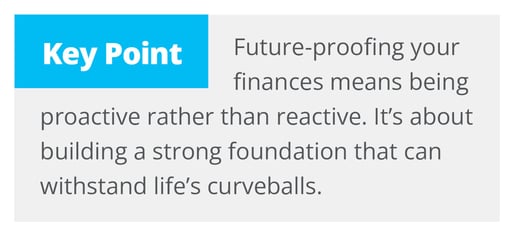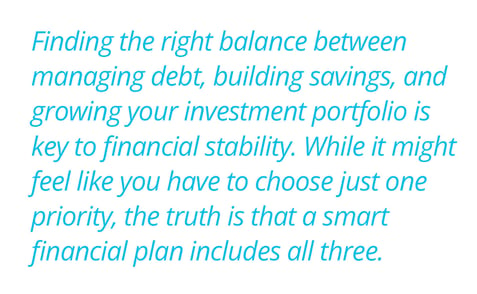Table of Contents
1. Why Future-Proofing Matters Now
2. Balancing Debt, Saving, and Investing
3. Setting the Stage by Life Stage
4. The Role of Investing in Long-Term Security
5. Smart Financial Habits You Can Start Today
6. Take Your First Step Now
What does it mean to “future-proof” your finances? While it may sound like a lofty goal, protecting your long-term financial health from uncertainty is something you can (and should) start right now. Financial planning isn’t just for people who are struggling, going through a large financial crisis, or are navigating debt. This type of planning for the future is for anyone who wants stability, flexibility, and freedom for their financial situation. When looking at your expenses and your financial goals, we will help you prepare to take the next step today.
Why Future-Proofing Matters
If someone asked you how you feel about your current financial situation, how would you respond? No matter your answer, you could benefit from a financial plan for your future. Factors like inflation, changing income, or varying living expenses might cause a domino effect on your financial stability.

Future-proofing your finances means being proactive rather than reactive. It’s about building a strong foundation that can withstand life’s curveballs. By taking control of your saving, investing, and debt management strategies now, you’re setting yourself up for long-term success. This doesn’t mean predicting the future; it means creating a flexible financial plan that allows you to adapt when things inevitably change. Preparing for anything can have your future self thanking you in the present.
Avoiding Today’s Common Financial Mistakes
When it comes to building long-term financial stability, many people fall into avoidable traps. One of the most common is overspending, often the result of living beyond your means or not tracking day-to-day expenses. This quickly leads to under-saving, where there's little or nothing left to contribute to emergency funds or future financial goals. While it may feel manageable in the short term, this habit can seriously limit your ability to build wealth or navigate financial setbacks.
Another mistake is ignoring debt. Whether it’s credit cards, personal loans, or student debt, leaving balances unpaid or making only minimum payments can lead to growing interest and long-term financial strain. A lack of a clear plan to reduce or manage debt makes it harder to focus on future goals like homeownership, retirement, or starting a business.
Finally, many individuals miss out on the benefits of a long-term investment strategy. Even if you're saving regularly, keeping your money in a basic savings account won’t help it grow meaningfully over time. Creating an investment plan aligned with your financial goals and risk in mind is the smartest way to start.
Balancing Debt, Saving, and Investing
Finding the right balance between managing debt, building savings, and growing your investment portfolio is key to financial stability. While it might feel like you have to choose just one priority, the truth is that a smart financial plan includes all three, just in the right proportion for your income and current expenses.
Start by reviewing your budget to understand where your money is going. If you don’t already have an emergency fund, that should be one of your top priorities. Aim for at least three to six months of living expenses. At the same time, begin tackling high-interest debt (like credit cards) to reduce long-term financial pressure. This dual focus helps you build security while lowering liabilities.
As your financial footing improves, it’s time to think long term. Should you prioritize saving for retirement, paying off loans, or investing? The answer often depends on your specific goals and time horizon. In general, contributing to retirement savings, especially if your employer offers a match, is a smart move early on. From there, look at how your remaining funds can be used to pay down debt faster or begin investing in diversified assets that align with your overall investment strategy.
Remember, the best financial plan is one that evolves with your life. With a step-by-step approach rooted in your income and expenses, you can take action today that positions you for a more secure tomorrow.
Setting the Stage by Life Stage
Your financial needs and the way you plan for them evolve as you move through different stages of life. Understanding what to prepare for in each decade can help you build a strong foundation that supports both your short-term needs and long-term dreams.

In Your 20s:
This is the decade to lay the groundwork. Focus on building healthy money habits like budgeting, managing living expenses, and consistently saving, even if it’s a small amount. Start an emergency fund, pay off high-interest debt, and contribute to a retirement account as early as possible because compound growth begins now.
In Your 30s:
As your income grows, so do your responsibilities. This is often the time for major life events like buying a home, starting a family, or changing careers. These milestones require thoughtful financial planning, from expanding your emergency fund to reviewing insurance needs. Keep saving for retirement, and consider more intentional investing based on your long-term goals.
In Your 40s:
You may be entering your peak earning years, but you’re also juggling more complex financial responsibilities. Think college savings for kids, upgrading your home, or caring for aging parents. Prioritize growing your retirement savings while also planning for big-picture expenses, including healthcare. This is also a good time to reassess your financial goals and adjust your plan accordingly.
In Your 50s and Beyond:
Now’s the time to fine-tune your retirement timeline. Increase contributions to your retirement accounts if possible, eliminate remaining debt, and start estimating what your ideal retirement lifestyle will cost. Don’t forget to prepare for potential caregiving responsibilities or unexpected health-related costs. Smart financial planning now helps ensure your savings support the lifestyle you’ve envisioned.
No matter your age, future-proofing your finances means looking ahead while taking practical steps today. Each decade brings new priorities, and with the right plan in place, you can confidently meet them.
The Role of Investing in Long-Term Security
If saving is the foundation of financial security, investing is the engine that helps grow your wealth over time. While it’s important to set aside money for emergencies and short-term needs, future-proofing your finances means taking steps today to make your money work harder for you.
So, what role does investing play? It allows your money to grow through compound interest, a powerful force that rewards those who start early. Even small contributions to an investment account can grow significantly when left untouched over many years. It’s not just about reaching retirement because smart investing can help you achieve other long-term goals like funding education, buying property, or even starting a business

To build an effective investment portfolio, start by identifying your financial goals, timeline, and risk tolerance. Are you looking to build wealth slowly over time, or are you preparing for a specific milestone in 10 or 15 years? Once you understand your objectives, you can craft an investment strategy that includes a mix of assets (like stocks, bonds, or mutual funds) that aligns with those goals. A diversified portfolio helps manage risk while giving your money room to grow. Whether you're just getting started or refining your strategy, investing wisely is a core step in any future-focused financial plan.
Smart Financial Habits You Can Start Today
Good financial habits don't need to be complicated. In fact, small, consistent actions often have the biggest impact. One of the most effective ways to stay on track is through automation like setting up scheduled transfers for saving, bill pay, or retirement contributions. This helps ensure you meet your financial goals without relying on memory or motivation alone.
Consider automating your paycheck so a portion goes directly into savings or a retirement account. You can also set up automatic payments for recurring bills, which can prevent missed due dates and late fees. These strategies support strong money management and reduce financial stress.
Equally important is creating a regular financial check-in routine. Whether it’s monthly or quarterly, take time to review your income, spending habits, and overall progress toward your financial planning goals. This keeps you in control of your finances and allows for early course correction if needed. At Addition Financial, we believe that good habits are the backbone of long-term financial wellness. With the right systems in place, you're not just reacting to your financial situation; you're actively shaping it.
Take Your First Step Now
To be consistent, start small and simple. By leveraging resources available to you, you will maximize your money for the future, and Addition Financial is happy to partner with you to create good financial habits. Part of thinking about future financial planning means preparing for what you might not expect, so our Emergency Savings Plan Builder is just one great resource to help check that off your must-do list. We have additional resources like various online calculators and other blogs to guide you along the way. Need additional help? Schedule an appointment with us to talk one-on-one about your plan, and we’ll lace up our shoes with you to take the next step.
/AFCU_93-EmergencySavingsPlan-CTA.jpg?width=1143&height=262&name=AFCU_93-EmergencySavingsPlan-CTA.jpg)





/AFCU_93-EmergencySavingsPlan-CTA.jpg?width=1143&height=262&name=AFCU_93-EmergencySavingsPlan-CTA.jpg)